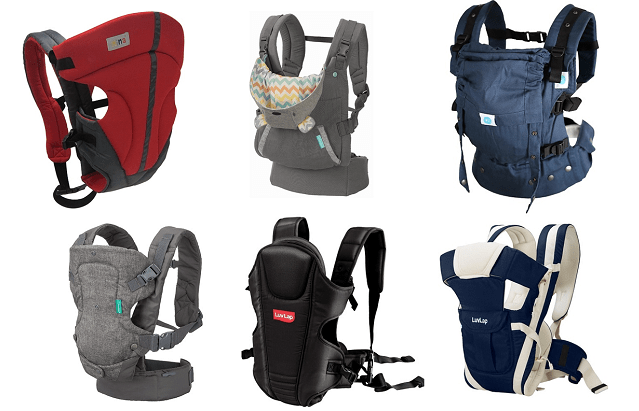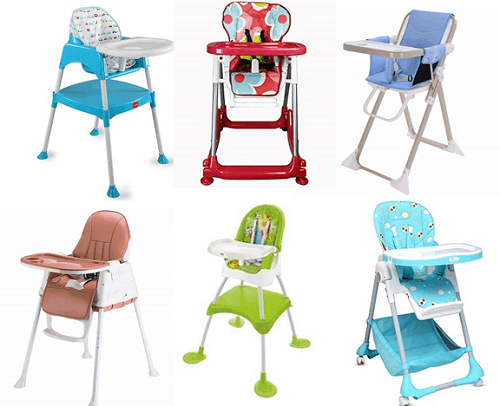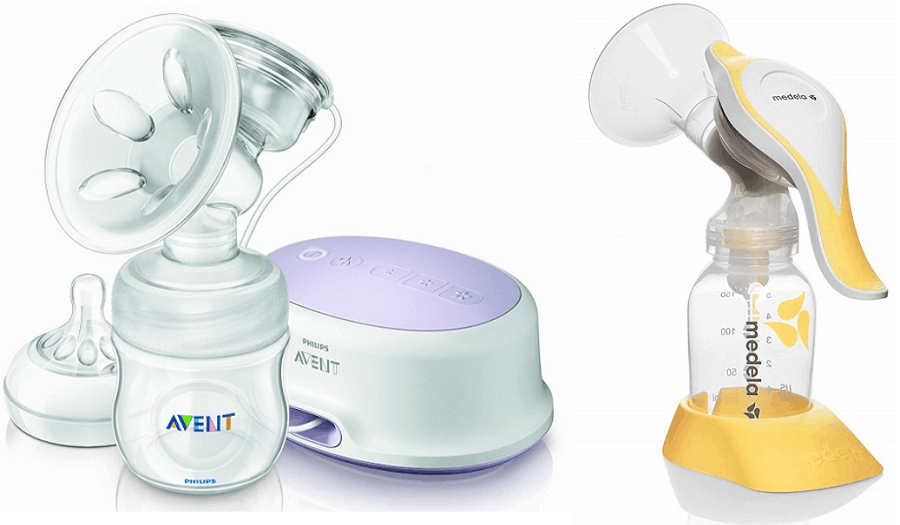10 Best Baby Food Brands & Products in India
Being a parent is not as easy as it sounds. You not only have to think about the future of your child but have to also make sure they get the best. And when they are just a baby, the most important thing to do is to feed them healthy and nutritious food that is available in the market.
But you cannot give your babies any random food and have to be careful what and when you feed them. Well, lucky for us, there are a lot of baby food products in the market. You have to be careful when selecting a food product if you want your baby to enjoy the food and be healthy.
Not sure how to do that? Well, then this guide will be perfect for you. In this guide, we have mentioned a few factors that you should consider when choosing a baby food and a list of the top baby food brands in India.
Is Baby Food safe for Baby?
Yes, the best baby food brands are generally safe for babies. These brands use high-quality ingredients, follow strict safety standards, and adhere to regulations set by government agencies such as Food Safety and Standards Authority of India (FSSAI).

However, it’s important to always check the labels and ingredients list of any baby food product to ensure it is appropriate for your baby’s individual needs and to avoid any potential allergens or additives. Additionally, always follow the recommended age guidelines and serving sizes for the product.
If you have any concerns or questions about a particular brand or product, it’s always a good idea to consult with your pediatrician.
Breast Feeing Vs Baby Food?
Breastfeeding and baby food are both important for a baby’s nutrition, but they have their differences.
Breastfeeding provides a baby with all the necessary nutrients for growth and development, as well as antibodies to fight infections and diseases. Breast milk is easily digestible and can help prevent digestive problems like constipation. Additionally, breastfeeding can promote bonding between mother and baby, and it can have health benefits for the mother as well, such as reducing the risk of breast and ovarian cancer.
Baby food, on the other hand, is introduced to a baby when they are ready for solid foods, typically around 6 months of age. It provides additional nutrients and helps babies learn to eat a variety of textures and flavors. Baby food can be homemade or store-bought and is available in a variety of forms, including purees, cereals, and snacks.
It’s important to note that breastfeeding is recommended as the best source of nutrition for babies for the first six months of life. After six months, complementary feeding with baby food can be introduced while continuing to breastfeed. However, every baby is different, and it’s important to consult with a pediatrician to determine what is best for your baby’s individual needs.
[content-egg-block template=custom/all_offers_list]
Things to Consider When Choosing a Baby Food Brand
Choosing a healthy and good baby food can be a little tricky so make sure that you follow the following processes
Choose between a Meal and a Snack
You will find both the options of snacks and complete meals in baby food products. So, you need to decide what kind of food are you looking for your baby.
If you are looking for a meal, then make sure that the meal is filling and nutritious. This doesn’t mean that you never make proper meals for your babies and just feed them baby food. However, these baby meals are perfect for the days when you are tired to cook or if your baby is a fussy eater.
Make sure that you take a look at the ingredients’ list and ensure that there aren’t unnecessary items like added sugar, preservatives, etc. Trust me, you don’t want to feel your kids all this garbage.
Apart from meals, you also get snacks as baby food which can be perfect for your teething baby. This keeps them occupied between meals and won’t be hard on their stomach or teeth as well like adult snacks would be. There are different types of snacks available, based on the age and texture of the food.
Also Read: 10 Best Convertible Baby Car Seats
It is important that you check for healthy ingredients in the baby snack food as well. Also, opt for snacks like wafers, fruit purees, etc., as it is not filling so your baby will have a proper meal later.
Select between Ready-to-Eat and Need to Cook Type
Next, you need to determine whether you want a ready to consume baby food or something which would require a little cooking and preparation. This also depends on whether you are going to feed your baby indoors or outdoors.
If you are planning to take your baby outdoors then you need to carry a ready-to-eat snack baby food. This will come handy when the milk is over and your baby still feels a little hungry. Choose baby food products that come in travel-ready packaging and are easy to carry around.
However, if you are going to be feeding your baby indoors then you can opt for a nutritious and filling ready-to-cook meal. These baby food products are better than snacks and can act as a substitute for a proper meal sometimes.
Top 10 Best Baby Food Brands to Buy
1. Nestlé CERELAC Fortified Baby Cereal
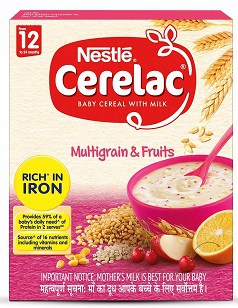
Check Cheapest Price : Amazon
One of the best baby food bands, Nestle always offers the best baby food products to parents and Nestle Cerelac Fortified Baby Cereal is no different.
This baby food is perfect for 12+ months old babies and is a completely vegetarian product. It contains around 17 vitamins and minerals and is quite rich in iron.
Also Read : 10 Best Baby Bottle Sterilizers
Since infants and small children need more nutrients, this baby food provides 55% of the daily iron take to your child in just 2 serves.
Another great thing about this baby cereal is that it is safe and healthy for your child as it is free of added sugar, preservatives, flavors.
It is also quite reasonably priced and is quite easy to make.
So, if you are looking for a nutritious meal for your baby then Nestle Cerelac Fortified Baby Cereal is a perfect choice.
2. Nestlé CEREGROW Fortified Multigrain Cereal
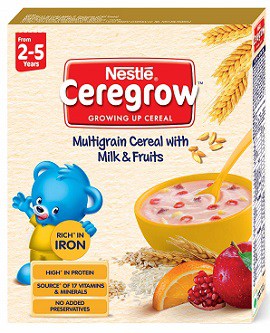
Check Cheapest Price : Amazon
Another top baby food by Nestle which is ideal for the 2-5 years age group, Nestle Ceregrow Fortified Multigrain Cereal is extremely nutritious.
This nutrient-rich baby food consists of multigrain, milk, and fruits which make it healthy for your baby and delicious at the same time.
Perfect for fussy eaters, Nestle Ceregrow Fortified Multigrain Cereal is filled with vitamins and minerals which help your child grow properly.
Also Read : Best Breast Pumps in India
It is apple, mango, orange, pomegranate, and blackcurrant and has no added flavors. It is also rich in iron so it helps your child’s normal cognitive development.
And since it is free from preservatives, it is quite safe for consumption as well.
Overall, this is a good, budget-friendly choice for anyone whose focus is on the growth and development of their child.
3. Enfamil A+ Infant Formula
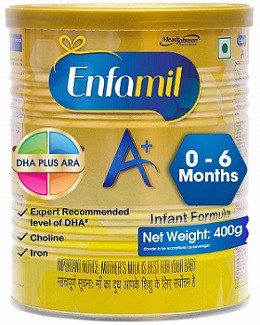
Check Cheapest Price : Amazon
If you are looking for reliable baby food to get your baby started on foods apart from breast milk then Enfamil A+ Stage 1 Infant Formula is perfect for you.
This baby food is ideal for babies up to 6 months age and offers the right nutrition level for infants.
It contains expert-recommended levels of DHA and ARA which can help in the growth of your infant’s brain and improvement in their cognitive functions.
Apart from that, Enfamil A+ Infant Formula also consists of choline and iron which can further help in brain development of the infant.
It is quite easy to make and you should always use milk for the best nutritious value and is quite easily digestible as well. And it is extremely safe to use as it contains no preservatives or additives.
4. Enfagrow A+ Nutritional Milk Powder
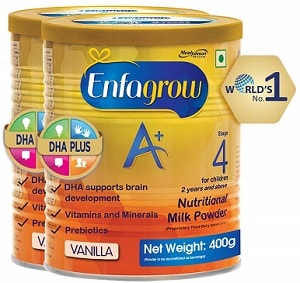
Check Cheapest Price : Amazon
Another top baby food to consider for your growing infant is the Enfagrow A+ Nutritional Milk Powder.
A nutritional health drink for kids who are aged 2+, Enfagrow A+ Milk Powder is full of nutrients, vitamins, and dietary provisions which will help you manage any kind of deficiency in your kid.
Focusing on both the physical and cognitive development of your baby, this baby food contains DHA which helps in brain development.
Also Read : 10 Best Baby Walker in India
Apart from that, this baby food also contains calcium, phosphorous, Vitamin D, and magnesium which help in physical growth.
And the presence of zinc, iron, Vitamin A, B, C, and E helps in building immunity in your child against digestive diseases, respiratory diseases, and infections.
This milk formula will provide your baby with a balanced supply of nutrients and is perfect for active babies.
It also has a great vanilla flavor and a great texture which makes it fun to drink for the kids as well.
5. Early Foods Organic Porridge Mixes
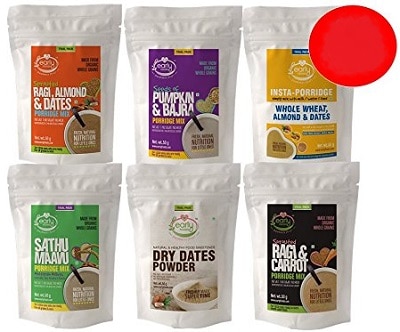
Check Cheapest Price : Amazon
Perfect for babies which are over 6 months, Early Foods Organic Porridge Mixes contains no additives or preservatives.
As a result, they are healthy for your baby and offer them nutrients to promote their holistic growth and development.
Although these packages are small, it is a great way to find which flavor appeals to your kid the most.
Although the package size is small, you can use it both as a meal or a light snack, it works either way.
And it can be super easy to make it quickly for your baby for a quick bite. This 100% vegetarian product is mage up of organic ingredients which help in the maximum absorption of the nutrients.
Overall, this is a great dietary supplement and is definitely one of the best baby food in the market.
6. Nestle Nestum Infant Cereal
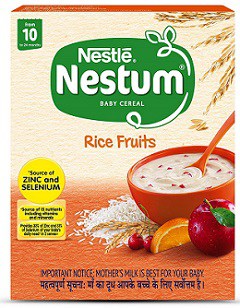
Check Cheapest Price : Amazon
Another top vegetarian baby food by Nestle, Nestum Infant Cereal is ideal for babies that are 10 to 24-months old.
Free from artificial flavors, preservatives, or colors, this baby food is safe to use and is really easy to prepare and feed your baby as well.
It contains a combination of fruits and rice which can complement your infant’s diet and provide the nutrients which they otherwise miss in their regular meals.
And one of the best things about this baby food is that it can be mixed with other freshly prepared foods like mashed vegetables, fruit juices, boiled and mashed dals, and so on.
This makes delicious and more nutritious for the baby. Also, it is quite cheap as well and provides essential dietary and health development requirements for your kids for normal growth.
7. Similac Advance Follow-Up Infant Formula
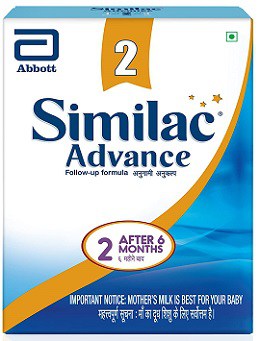
Check Cheapest Price : Amazon
Similac Advance is another amazing baby food brand that offers safe and nutritional baby foods and this Follow-Up Infant Formula is no different.
Similac Advance Follow-Up Formula is perfect for babies aged 6 months or more and provides essential dietary requirements for the baby while complementing other foods that the baby has at this stage.
This vegetarian baby food is made up of neuro-nutrients like choline, iron, Omega-3, folic acid, fatty acids, etc. which help in the baby’s brain development.
It is also easy to digest and helps in calcium absorption which helps in the overall growth of your baby.
It comes in good packaging and is quite easy to prepare and would make an amazing supplement for your baby.
8. Tiny Spoons Organic Baby Food Puree
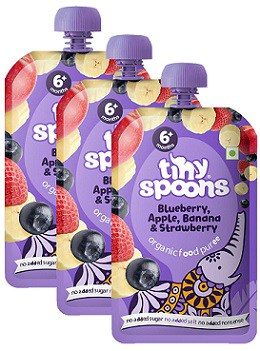
Check Cheapest Price : Amazon
Healthy and nutritious baby food that is delicious and contains nature’s goodness is the Tiny Spoons Organic Baby Food Puree.
Extremely convenient to open and eat, this baby food is prepared without any preservatives or added flavors and comes in BPA-free packaging so it is safe and healthy for your baby use.
And the best part is that you can use them either as a proper meal or just as a snack, it is entirely up to you.
Also Read: 10 Best Baby Strollers
This product is made up of organic fruits like apple, strawberry, banana, prune, blueberry, and plum so your baby gets the natural taste and essential nutritients from this product.
All you need to do is open the package and feed your baby the puree, it is as simple as that.
9. Nestle LACTOGEN 1 Infant Formula Powder
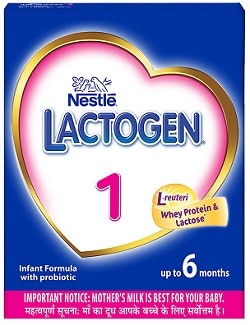
Check Cheapest Price : Amazon
Another top baby formula that is ideal for infants up to 6 months of age is the Nestle Lactogen 1 Infant Formula Powder.
This milk formula is perfect for infants who aren’t being breastfed due to medical issues and should be taken as a milk substitute only on the recommendation of a health worker.
This baby formula is extremely easy to prepare and requires minimum cooking time.
Also Read : Best Baby Swings in India
With this nutrient-rich baby formula, your baby will get the necessary vitamins and minerals which are required for the physical and cognitive development of your baby.
And one of the best things about this milk formula is that it is easier to digest and doesn’t affect the poop color or texture of your baby as well.
10. Slurrp Farm Organic Baby Cereal
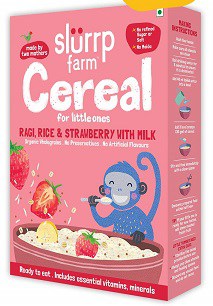
Check Cheapest Price : Amazon
Another baby food which is perfect for 6 months and above, Slurrp Farm Organic Baby Cereal is 100% natural and safe to use.
It doesn’t contain any color, flavor, or preservatives and contains the real strawberry fruit which lends the nice flavor to this cereal.
This cereal is made up of ragi which is known to have 10 times more calcium than wheat or rice and helps in bone growth and development.
It is rich in iron and contains other vitamins and minerals as well which can help in your baby’s growth.
In fact, just 2 serves of this cereal in a day can take care of 60% of your baby’s daily iron requirement.
Baby Milk Cereal Based Food vs Formula?
Cereal-based foods and formula are both options for feeding babies, but they serve different purposes.
Cereal-based foods, such as rice cereal or oatmeal, are often introduced to babies when they are ready for solid foods, around 4-6 months of age. These foods provide additional nutrients, such as iron, and help babies learn to eat and develop their motor skills. However, they should not be the only source of nutrition for babies, as they do not provide all the necessary nutrients for growth and development.
Formula, on the other hand, is a specialized milk substitute that is designed to provide all the necessary nutrients for babies who are not breastfed. It is made to mimic the composition of breast milk as closely as possible, and it contains a balanced mix of proteins, fats, carbohydrates, vitamins, and minerals. Formula is a complete source of nutrition for babies and can be used as the sole source of nutrition until the baby is ready for solid foods.
Ultimately, whether to feed your baby cereal-based foods or formula will depend on your baby’s individual needs and your pediatrician’s recommendations. It’s important to provide a balanced and varied diet for your baby that meets their nutritional needs at each stage of development.
Consider the Age Group for the Baby Food
When selecting baby food, it’s important to consider the age group for which the food is intended. Different age groups have different nutritional needs and developmental stages, and the types of foods that are appropriate for each stage will vary.
Here are some general guidelines for the age groups and the types of foods that are appropriate for each:
- 0-6 months: Breast milk or formula should be the primary source of nutrition for babies during this stage. Introducing solid foods before 4-6 months of age is not recommended.
- 6-8 months: At this stage, babies may begin to show signs of readiness for solid foods. Pureed or mashed fruits and vegetables, such as sweet potatoes, apples, pears, carrots, and peas, can be introduced.
- 8-10 months: As babies develop their motor skills and can handle more textured foods, soft cooked fruits and vegetables, such as bananas, avocados, and broccoli, can be introduced. Soft cooked proteins, such as eggs, chicken, and tofu, can also be introduced.
- 10-12 months: As babies approach their first birthday, they can begin to eat a wider variety of foods, including small pieces of soft foods, such as cooked vegetables and soft fruits. They can also try finger foods, such as crackers and cheese.
It’s important to note that these are general guidelines, and the exact age at which a baby is ready for different types of foods will vary depending on the individual baby’s development. Always consult with your pediatrician before introducing any new foods to your baby’s diet.

What are some good first foods to introduce to my baby?
When your baby is ready to start solid foods, typically around 6 months of age, there are a variety of nutritious and easy-to-digest first foods that you can introduce. Here are some good options:
- Single-grain infant cereal: Iron-fortified rice cereal or oatmeal cereal mixed with breast milk or formula is a common first food for babies.
- Pureed vegetables: Sweet potato, squash, carrot, and peas are good options. Start with one vegetable at a time and wait a few days before introducing a new one to check for any signs of allergies.
- Pureed fruits: Apples, bananas, pears, and avocados are good options. Again, start with one fruit at a time and wait a few days before introducing a new one.
- Plain whole milk yogurt: Full-fat plain yogurt can be a good source of calcium and protein for babies.
- Soft-cooked vegetables: Small pieces of soft-cooked vegetables such as carrot or sweet potato can be good for babies who are starting to feed themselves.
Remember, every baby is different and may have individual preferences or needs. Be sure to introduce new foods one at a time and watch for any signs of an allergic reaction such as rash, diarrhea, or vomiting. Always consult with your pediatrician before introducing any new foods to your baby.
Should I make homemade baby food or buy store-bought baby food?
Both homemade baby food and store-bought baby food can be safe and nutritious options for your baby. It ultimately depends on your personal preference and lifestyle.
Homemade baby food can be a good option if you have the time and resources to prepare it. Making your own baby food allows you to control the ingredients and avoid any preservatives or additives that may be present in store-bought baby food. Homemade baby food can also be more cost-effective than store-bought options.
On the other hand, store-bought baby food can be convenient for busy parents or when traveling with your baby. Most store-bought baby foods are fortified with vitamins and minerals, which can be beneficial for your baby’s nutrition. Additionally, some store-bought baby foods are organic or made from high-quality ingredients.
When deciding between homemade and store-bought baby food, it’s important to consider factors such as cost, convenience, and nutritional value. Whether you choose to make your own baby food or buy store-bought options, be sure to check the expiration date and avoid any products with damaged packaging. Additionally, always consult with your pediatrician before introducing new foods to your baby.
Should I be concerned about the additives and preservatives in some store-bought baby foods?
It’s understandable to be concerned about the additives and preservatives in some store-bought baby foods. While not all additives and preservatives are harmful, some may have potential health risks. However, it’s important to note that the use of additives and preservatives in baby food is regulated by government agencies such as the FDA to ensure their safety.
Many store-bought baby foods use small amounts of additives and preservatives to maintain the quality and freshness of the food. Common additives and preservatives in baby food include citric acid, ascorbic acid (vitamin C), and tocopherols (vitamin E).
If you’re concerned about the additives and preservatives in store-bought baby food, you can look for brands that use fewer or no additives and preservatives. Organic baby foods are also a good option, as they are often made with high-quality, natural ingredients and are free from synthetic additives and preservatives.
Ultimately, the decision to use store-bought or homemade baby food is up to you as a parent. If you have concerns about the additives and preservatives in baby food, talk to your pediatrician about the best options for your baby’s nutrition.
Do parents use baby food in India?
In India, parents have different preferences for feeding their babies. Traditionally, breast milk has been the primary source of nutrition for infants, and many parents continue to breastfeed exclusively for the first six months of their baby’s life, as recommended by the World Health Organization.
However, there has been an increasing trend in India towards using commercial baby food products. Some parents choose to use these products because of their convenience and ease of use, especially for working mothers. Others may use them to supplement their baby’s diet or as a substitute for homemade food when they are unable to prepare it.
It’s worth noting that the quality and safety of baby food products in India vary widely, and it’s important for parents to be aware of the ingredients and nutritional content of the products they choose. Parents should also consult with their pediatrician before introducing any new food products to their baby’s diet.
Overall, the choice between homemade and commercial baby food is a personal decision for parents and may depend on factors such as convenience, cost, and nutritional preferences.

What are some signs that my baby is ready for more or different types of foods?
As your baby grows, they will show signs that they are ready for more or different types of foods. Here are some signs to look for:
- Increased appetite: If your baby is finishing their current amount of food and still seems hungry, they may be ready for more food or a different type of food.
- Interest in what you’re eating: If your baby shows an interest in the food you’re eating and reaches for it or tries to grab it, it may be a sign that they are ready for more variety in their diet.
- Ability to sit up unsupported: As your baby develops more core strength and can sit up unsupported, they may be ready for more solid foods that require more chewing.
- Loss of the tongue-thrust reflex: At around 4-6 months of age, babies have a natural reflex that causes them to push food out of their mouths with their tongues. If this reflex has disappeared, it may be a sign that they are ready for more solid foods.
- Chewing motions: If your baby starts making chewing motions with their mouth or trying to chew on things, it may be a sign that they are ready for more textured foods.
Remember, every baby is different, and it’s important to watch for signs that your baby is ready for new foods rather than following a strict timeline. Always consult with your pediatrician before introducing any new foods to your baby’s diet.
[content-egg-block template=custom/all_offers_list]
How do I ensure that my baby is getting all the necessary nutrients from their food?
Ensuring that your baby is getting all the necessary nutrients from their food is important for their growth and development. Here are some tips to help you do so:
- Breastfeed or use formula: Breast milk or formula should be the primary source of nutrition for babies until they are six months old. This provides them with all the necessary nutrients they need for healthy growth and development.
- Offer a variety of foods: As your baby starts to eat solid foods, offer a variety of foods from each food group. This includes fruits, vegetables, grains, proteins, and dairy.
- Focus on nutrient-dense foods: Choose foods that are high in nutrients, such as sweet potatoes, avocados, eggs, salmon, and leafy greens.
- Don’t overdo it on one food group: While it’s important to offer a variety of foods, it’s also important not to overdo it on one food group. For example, too much fruit can be high in sugar and not provide enough protein or healthy fats.
- Consider vitamin and mineral supplements: If you’re concerned that your baby may not be getting all the necessary nutrients from their food, talk to your pediatrician about adding a vitamin and mineral supplement to their diet.
- Don’t add salt or sugar: Avoid adding salt or sugar to your baby’s food. Babies have a natural preference for sweet tastes, so they don’t need added sugar in their food. Additionally, their kidneys are not yet mature enough to handle excess salt.
Remember to always consult with your pediatrician before introducing any new foods or supplements to your baby’s diet, and to follow their guidance for your baby’s specific nutritional needs.
Also Read:
1) Best Baby Bottle Sterilizers in India
2) 10 Best Baby Carrier in India
3) Top 10 Best Breast Pumps in India
This content is collaboratively crafted and vetted by Shubham, a Mechanical Engineering specialist. His passion for unraveling the intricacies of machinery and consumer electronics mirrors his avid interest in gaming. With his wealth of expertise, Shubham adeptly navigates readers through the complexities of audio, home appliances, and everyday products, guaranteeing a smooth and enjoyable shopping journey. For every product you read about on this site we do rigorous research and testing behind the scenes to bring you the best value for money options. For any query directly reach out to me at my personal Instagram - https://www.instagram.com/shubhamgarg8024/

